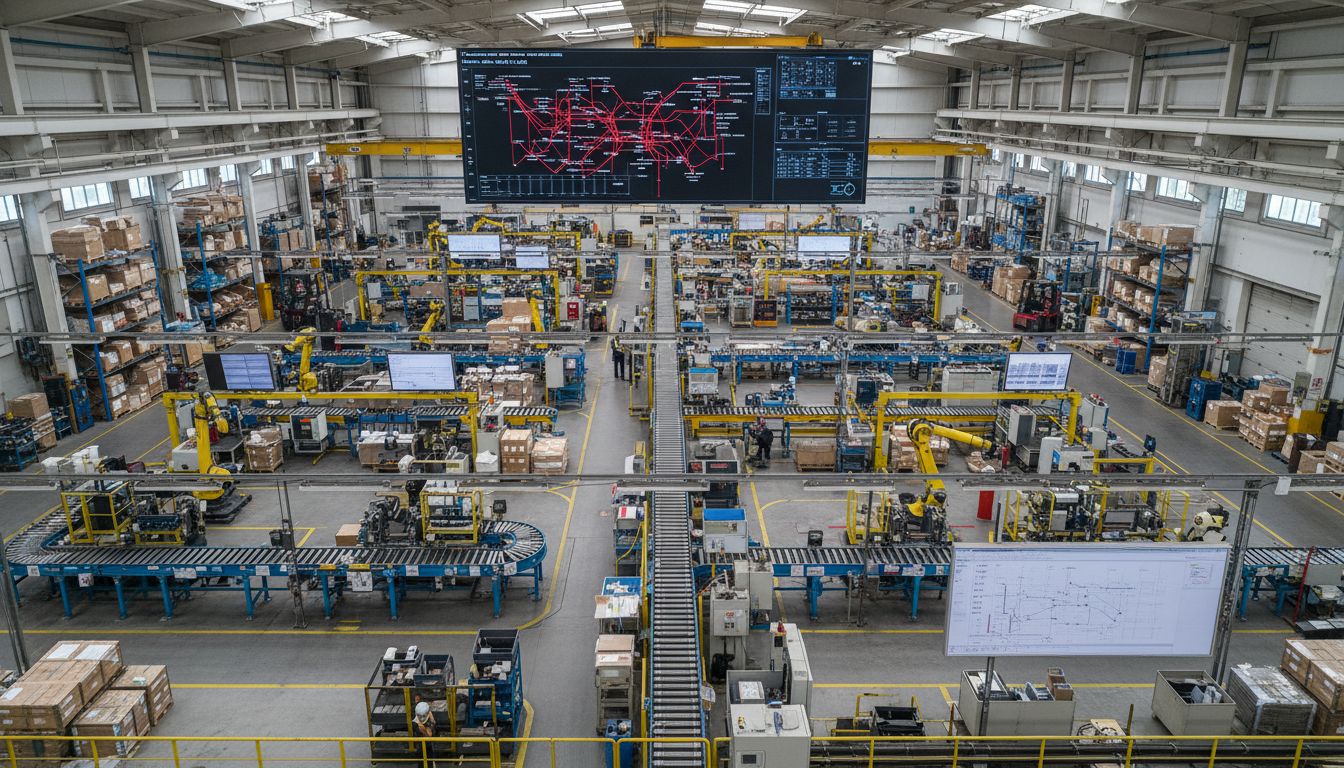Complete Guide to the Role of AI in Operations

Nearly 80 percent of business leaders believe artificial intelligence is reshaping how their organizations operate. Companies face daily pressure to move faster, work smarter, and make accurate choices with growing amounts of information. As AI moves from experimental labs to business-critical functions, leaders who embrace these advanced tools are seeing faster decisions, fewer disruptions, and stronger results. This shift marks a turning point where technology and human insight combine to solve complex operational challenges.
Key Takeaways
| Point | Details |
|---|---|
| AI as a Strategic Partner | AI has evolved to become a core partner in operational strategies, enabling smarter decision-making and real-time optimization of processes. |
| Diverse Industry Applications | Across various sectors, AI applications are transforming operations, tailoring solutions to meet unique industry challenges and demands. |
| Benefits of AI Integration | Implementing AI can yield significant operational improvements, such as enhanced forecasting accuracy and reduced equipment downtime. |
| Managing AI Risks | Organizations must address critical risks associated with AI, including cybersecurity and ethical considerations, through comprehensive governance frameworks. |
Table of Contents
- Defining AI’s Role In Modern Operations
- Types And Technologies Transforming Operations
- Real-World Applications Across Industries
- Benefits And Key Capabilities For Businesses
- Risks, Challenges, And Mitigation Strategies
Defining AI’s Role in Modern Operations
In the rapidly evolving business landscape, artificial intelligence has transformed from a futuristic concept to a practical operational tool that empowers organizations to make smarter, faster decisions. According to research from IBM, AI enables operations managers to analyze massive datasets, uncover hidden insights, predict potential challenges, and optimize processes in real time.
AI’s strategic role in modern operations goes far beyond simple automation. It represents a fundamental shift in how businesses approach complex decision-making. Key capabilities include:
- Predictive Analytics: Anticipating potential equipment failures before they occur
- Real-Time Optimization: Dynamically adjusting processes for maximum efficiency
- Advanced Data Analysis: Processing vast amounts of information faster than human teams
- Intelligent Forecasting: Generating more accurate operational predictions
A groundbreaking 2024 operations research survey demonstrates how AI techniques are revolutionizing operational research, particularly in enhancing parameter generation, model formulation, and optimization strategies. This signals a profound transformation where AI doesn’t just support operations—it becomes a core strategic partner in driving organizational performance.
The future of operations isn’t about replacing human expertise, but augmenting human capabilities. By integrating AI tools strategically, businesses can unlock unprecedented levels of efficiency, reduce operational risks, and create more adaptive, intelligent systems that respond dynamically to complex business challenges.
Types and Technologies Transforming Operations
The landscape of operational technologies is undergoing a remarkable transformation, driven by sophisticated AI systems that are revolutionizing how businesses approach complex challenges. A prime example is the AI factory concept, which represents an integrated decision-making engine that combines data pipelines, algorithmic development, and advanced infrastructure to power operations at an unprecedented scale.
Key technologies reshaping operational paradigms include:
- Machine Learning Algorithms: Enabling predictive and adaptive decision-making
- Natural Language Processing: Facilitating intelligent communication and analysis
- Robotic Process Automation: Streamlining repetitive tasks with high precision
- Advanced Analytics: Transforming raw data into strategic insights
According to research on AIOps (Artificial Intelligence for IT Operations), organizations can now leverage AI, machine learning, and big data analytics to automate critical IT service management tasks. This includes sophisticated capabilities like anomaly detection, event correlation, and intelligent incident resolution that dramatically simplify management of complex technological environments.
The most successful organizations are not just adopting these technologies—they’re reimagining their entire operational philosophy.
By integrating AI-driven tools strategically, businesses can create more resilient, adaptive systems that respond dynamically to emerging challenges, turning technological complexity into a competitive advantage.
Real-World Applications Across Industries
Artificial intelligence is no longer a futuristic concept but a practical tool transforming operations across diverse industries. Strategic AI implementation allows businesses to solve complex challenges and create unprecedented value. Learn how AI can future-proof your business today, unlocking competitive advantages previously unimaginable.
Across different sectors, AI applications demonstrate remarkable versatility:
Here’s a summary of AI applications across major industries:
| Industry | AI Applications | Key Benefits |
|---|---|---|
| Manufacturing | Predictive maintenance Quality control |
Reduce downtime Improve product quality |
| Healthcare | Diagnostic assistance Personalized treatment |
Enhance accuracy Improve patient outcomes |
| Retail | Inventory management Customer experience |
Optimize stock Boost engagement |
| Finance | Fraud detection Risk assessment |
Minimize losses Better compliance |
| Logistics | Route optimization Supply chain efficiency |
Lower costs Faster delivery |
- Manufacturing: Predictive maintenance and quality control
- Healthcare: Diagnostic assistance and personalized treatment planning
- Retail: Inventory management and customer experience optimization
- Finance: Fraud detection and risk assessment
- Logistics: Route optimization and supply chain efficiency
Each industry leverages AI differently, but the core principle remains consistent: transforming data into actionable intelligence. In manufacturing, AI-powered sensors can predict equipment failures before they occur. Healthcare organizations use machine learning algorithms to analyze complex medical imaging and support diagnostic processes. Retail companies deploy AI to understand customer preferences and personalize shopping experiences.
The true power of AI lies not in replacing human expertise, but in augmenting human capabilities. By integrating intelligent technologies strategically, businesses can create more adaptive, responsive systems that turn technological complexity into a sustainable competitive advantage. The future belongs to organizations that view AI not as a tool, but as a collaborative partner in driving innovation and operational excellence.
Benefits and Key Capabilities for Businesses
AI represents a transformative opportunity for businesses seeking to drive operational excellence and strategic advantage. Why invest in AI now? The potential benefits are both substantial and measurable. According to research from IBM, AI technologies can deliver extraordinary operational improvements:
- Forecasting Accuracy: Reducing errors by up to 50%
- Inventory Management: Cutting lost sales from stockouts by 65%
- Predictive Maintenance: Reducing equipment downtime by 30%
- Quality Control: Enabling near-perfect visual inspection (up to 97% accuracy)
A groundbreaking BCG report highlights that future-built firms strategically embed AI across critical operational domains like R&D, manufacturing, IT, and marketing. These organizations distinguish themselves through long-term planning, continuous workforce upskilling, robust enterprise data governance, and a sophisticated approach to blending pre-built and custom AI tools.
Beyond raw efficiency metrics, AI enables businesses to unlock deeper strategic capabilities. It transforms decision-making from reactive to predictive, allowing leaders to anticipate market shifts, optimize resource allocation, and create more resilient organizational structures. The most successful businesses won’t just adopt AI—they’ll integrate it as a core strategic partner, turning technological complexity into a sustainable competitive advantage.
Risks, Challenges, and Mitigation Strategies
While AI offers tremendous operational potential, businesses must navigate a complex landscape of emerging technological risks. Understanding AI governance becomes critical in managing these challenges effectively. According to research from IBM, key risks span multiple critical domains:
- Cybersecurity Vulnerabilities: Potential system breaches
- Data Privacy Concerns: Protecting sensitive organizational information
- Ethical Implications: Preventing algorithmic bias and unfair decision-making
- Regulatory Compliance: Ensuring adherence to evolving technological standards
According to operational risk experts, comprehensive mitigation strategies should include:
- Implementing secure-by-design architectural principles
- Establishing robust audit trails and accountability mechanisms
- Developing multilayered cybersecurity protocols
- Conducting regular model validation and performance assessments
- Maintaining active human oversight in critical decision processes
The most forward-thinking organizations recognize that AI risk management isn’t about elimination, but strategic navigation. By proactively developing comprehensive governance frameworks, continuously monitoring technological developments, and maintaining a human-centric approach, businesses can harness AI’s transformative potential while minimizing potential negative consequences. The goal is creating an adaptive, responsible AI ecosystem that balances innovation with prudent risk management.

Transform AI Concepts Into Real Business Results With Expert Guidance
You have learned how AI can reinvent operations through predictive analytics, real-time optimization, and risk management. Yet, making these technologies work for your company is not simple. Leaders often face obstacles like unclear ROI, overwhelming complexity, and questions about responsible implementation. If you are striving to move from theory to practice and create sustainable competitive advantage, you are not alone. Many businesses struggle to translate AI potential into concrete business outcomes.

Bring clarity and momentum to your AI journey today. Tap into over 25 years of global expertise with Average Robot’s consulting services, and receive tailored strategies that address your goals around agility, operational resilience, and revenue growth. Our team partners with you to make AI accessible and practical. Take the first step now by exploring how AI can future-proof your business or begin a conversation with our team at Average Robot. Gain a trusted partner dedicated to practical results and long-term success.
Frequently Asked Questions
What role does AI play in modern operations?
AI plays a strategic role in modern operations by enabling organizations to analyze large datasets, optimize processes, and make faster, smarter decisions. This includes capabilities like predictive analytics, real-time optimization, and advanced data analysis.
How can businesses benefit from AI technologies?
Businesses can benefit from AI technologies through improved forecasting accuracy, enhanced inventory management, reduced equipment downtime, and improved quality control. These benefits can lead to significant operational improvements and cost savings.
What are some real-world applications of AI in different industries?
AI is applied in various industries such as manufacturing for predictive maintenance, healthcare for diagnostic assistance, retail for inventory management, finance for fraud detection, and logistics for route optimization, each transforming data into actionable intelligence.
What are the risks associated with AI in operations?
Risks associated with AI include cybersecurity vulnerabilities, data privacy concerns, ethical implications like algorithmic bias, and regulatory compliance challenges. Companies must implement comprehensive governance frameworks to navigate these risks effectively.




